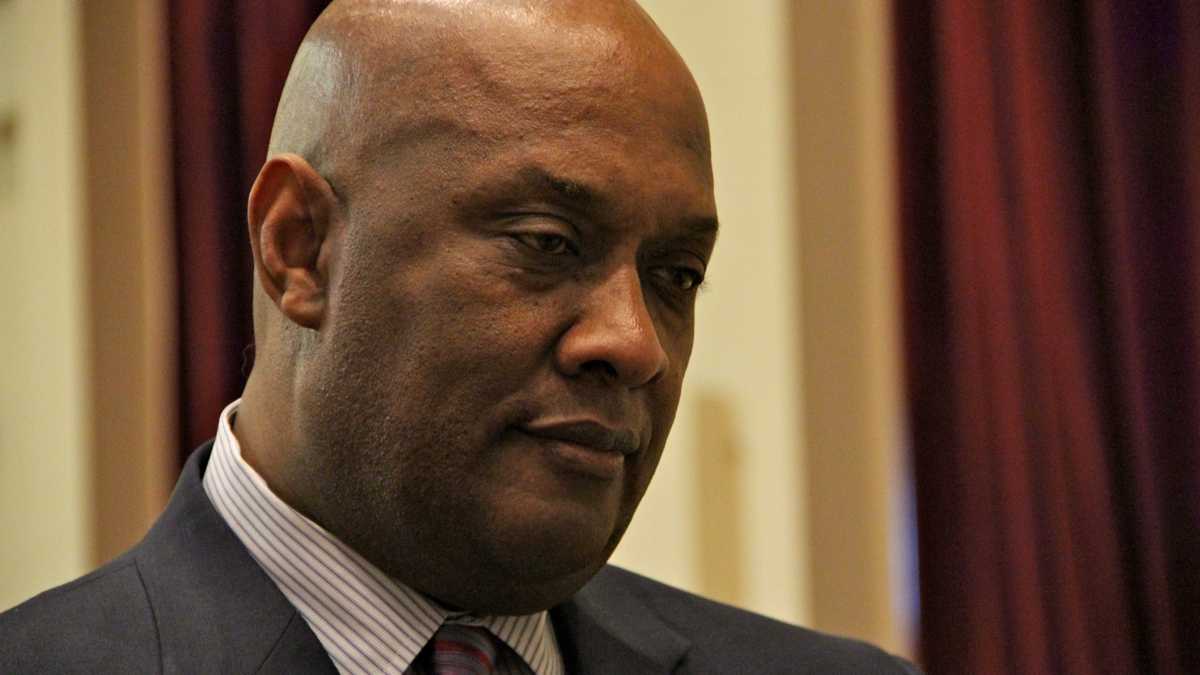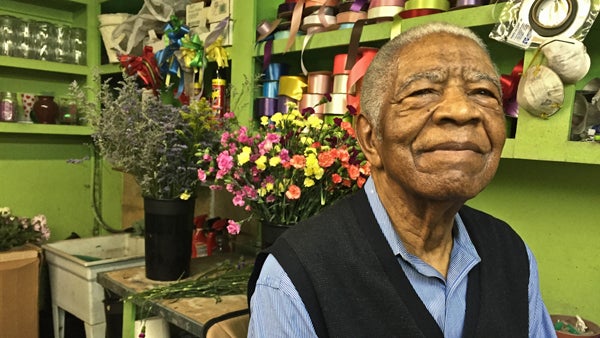After decades nurturing West Oak Lane, Evans seeks chance to serve in Congress
Listen
State Rep. Dwight Evans (Emma Lee/WHYY)
On a wet April morning, Paul Beale’s Flowers buzzed with activity.
His grandson and another employee built arrangements at the back of the shop. Up front, Beale’s daughter handled the register and phones.
“This is the beginning of the year — proms, weddings, Mother’s Day,” said Beale from a tall stool in between them.
The store opened along Ogontz Avenue in the 1970s, when businesses packed the commercial corridor in West Oak Lane.
 Owner Paule Beal credits Dwight Evans with bringing back the neighborhood. (Aaron Moselle/WHYY)
Owner Paule Beal credits Dwight Evans with bringing back the neighborhood. (Aaron Moselle/WHYY)
These days, the strip is going strong again. Roughly 80 percent of its storefronts are full. Beale gives state Rep. Dwight Evans a lot of credit for making that happen.
“Dwight brought it back. It’s that simple — with hard work and determination,” said Beale.
He’s not the only one who sees it that way.
“Dwight has been a savior up here. I hate to think what would have happened if one of the other candidates would have won,” said former resident Jim Newton.
Evans was elected in 1980. He was 25 years old, and Ogontz Avenue was a mess, filled with blight that developed after African-Americans moved in and white store owners moved out. Well over half of the commercial stock sat empty. Beale’s was one of the few survivors.
Evans made it his mission to transform the neighborhood. He started by bringing in a couple of anchor tenants — a Rite-Aid Pharmacy and a state liquor store — and never looked back.
The work was guided by a simple motto: Something is happening in West Oak Lane.
“It was about repositioning West Oak Lane as a community that was on the rise, on a rebirth,” said Evans in an interview.
That narrative is now fueling Evans’ run to replace indicted U.S. Rep. Chaka Fattah, whose federal corruption charges set the table for a four-man Democratic primary on Tuesday.
If elected, Evans wants to use what he learned in West Oak Lane to help transform struggling neighborhoods in other parts of the city — one block at a time.
“I’ve used my neighborhood like a laboratory,” said Evans.
‘Mr. ATM’ to the rescue
A lot of the money that spurred revitalization in West Oak Lane came in the form of state grants. More than a few were awarded to the Ogontz Avenue Revitalization Corporation, a nonprofit Evans founded in 1983 to help him build his vision for the neighborhood.
Between 2000 and 2010, OARC received $29.3 million from the state Department of Community and Economic Development to support projects and events such as the now-defunct West Oak Lane Jazz Fest.
In 2010, the festival’s penultimate year on Ogontz Avenue, the state awarded OARC $1 million to support the three-day fete.
None of it was dumb luck. By then, Evans was the Democratic chairman of the House Appropriations Committee. The position made it easier to steer dollars to Philadelphia and his district. Some local lawmakers nicknamed him “Mr. ATM.”
State Rep. Greg Vitali, who represents some of the wealthiest parts of Montgomery County, said he never had a problem with the dollars Evans secured for the city. It needed them — badly, Vitali said.
Not everyone felt that way.
“Certainly, if you’re from the other part of the state, not getting the benefit of this money, I’m sure there was a sense of resentment, but that’s the struggle of politics,” said Vitali.
In 2010, that struggle may have cost Evans his chairmanship on the Appropriations Committee — a post he held for two decades. He lost by two votes. Philadelphia state Rep. Angel Cruz, was one of them.
Cruz declined comment, but spoke freely in an editorial published in the Philadelphia Daily News following the vote.
“I myself didn’t get stuff that I had worked hard for. I’ve been waiting for $1.5 million for a project for five budget cycles that he still refuses to let go,” said Cruz, D-Philadelphia.
Evans is proud of his time on the committee — no matter what led to his ouster.
“I have no apologies about what I tried to do. It was open, it was transparent, it was accountable. There was no question about how I conducted myself,” he said.
Dismissing OARC probe as ‘political profiling’
The same can’t be said for the Ogontz Avenue nonprofit Evans founded. In 2013, the organization had to return $1.2 million in public money and withdraw four grant requests following a state probe into allegations of financial mismanagement.
The investigation accused OARC of misusing $12 million in state grants, violating bid rules and overpaying for real estate on the taxpayers’ dime.
Afterwards, Evans called the investigation a case of “political profiling.” He said the episode doesn’t undermine his leadership in West Oak Lane – just look at his results.
“I’m not trying to avoid not everything that’s perfect, but match up West Oak Lane and any other neighborhood in this congressional district that’s been transformed in the last 25, 30 years, I don’t think anyone else can show or demonstrate it [the same outcome],” said Evans.
Philadelphia attorney Dan Muroff and Lower Merion Township Commissioner Brian Gordon also hope to best Fattah in the Democratic primary.
If Evans wins, he would be on track to become 62-year-old freshman in a Congress that rewards seniority.
That doesn’t bother Evans.
“That’s a perfect argument for those who sit in status quo — who don’t want to do anything. Somebody like myself is just the opposite … always pushing the envelope.”
Pushing to turn potential into positive change — however long it takes.
WHYY is your source for fact-based, in-depth journalism and information. As a nonprofit organization, we rely on financial support from readers like you. Please give today.





